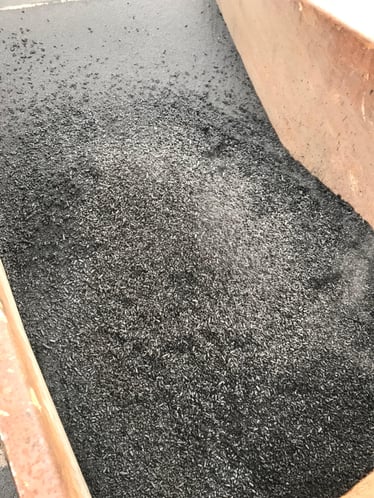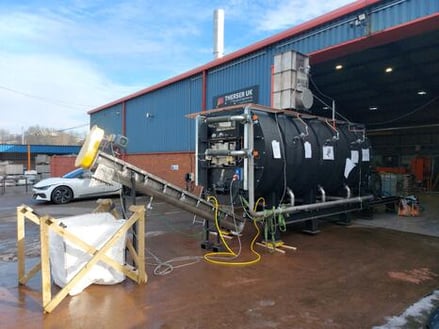Share this
What is Biochar? And How We Can Help?
by Therser Sales Team on 13-Feb-2023 15:45:39
Biochar is the carbon rich remains of organic material that has been heated to decompose and remove most of the hydrogen and oxygen. The process is called pyrolysis and is carried out in the absence of air/oxygen to prevent the material catching fire and burning. The black residue contains the remains of the starting material.
The Biochar process
Biochar is made through a process called pyrolysis, which involves heating organic material in the absence of oxygen. The process typically involves the following steps:
-
Feedstock preparation: The organic material, or feedstock, is prepared for pyrolysis. This may involve chopping, drying, or grinding the material, depending on its moisture content and size.
-
Pyrolysis: The prepared feedstock is placed in a pyrolysis reactor, which is then sealed and heated to high temperatures. The absence of oxygen in the reactor prevents combustion and allows the organic material to decompose into a stable and porous carbon-rich substance.
-
Cooling and collection: After the pyrolysis process is complete, the reactor is cooled and the biochar is collected.
-
Conditioning: The biochar may be conditioned to remove any residual moisture or volatile organic compounds. This can be done through air-drying, oven-drying, or the use of a vacuum system.
-
Application: The final product is then ready for use as a soil amendment, a filter for water or air purification, a component in the production of energy, or for other applications.
Overall, the pyrolysis process is a simple and efficient way to produce biochar from a wide range of organic materials. By converting waste materials into a useful and valuable product, biochar production can help to mitigate environmental challenges while providing economic benefits.

There are vast uses for the end material, there are a few listed below.
- Soil improvement: Biochar has been shown to improve soil fertility, water retention, and overall soil health. When added to soil, it can provide a stable source of nutrients and support the growth of healthy plant roots.
- Carbon sequestration: Biochar has the ability to store carbon in soil for hundreds or even thousands of years, making it a potential tool for mitigating climate change.
- Water and air purification: Biochar has been investigated for its potential as a filter for removing pollutants from water and air.
- Energy production: Biochar can be used as a fuel or a component in the production of energy.
- Livestock feed: Biochar can be used as a supplement in livestock feed to improve animal health and performance.
- Waste management: Biochar can be produced from a wide range of organic waste materials, making it a useful tool for managing and reducing waste.
- Greenhouse gas reduction: Biochar production can also help to reduce greenhouse gas emissions, as it can displace fossil fuels and capture carbon dioxide from the atmosphere.

At Therser UK we are proud to serve clients in a diverse range of sectors across the world. To find out more about our kilns, furnaces, dryers, RTOs and engineering services, download the free guide or e-mail sales@therseruk.com or call 01782 824453 to speak with a sales advisor directly.
Share this
- Company News (90)
- Battery Materials (41)
- kiln (37)
- fabrication (29)
- Alloy (27)
- Furnace (27)
- Welding (16)
- Industrial Kilns (15)
- Battery (13)
- Ceramic Kilns (13)
- Processes (13)
- alloy fabrication (13)
- Shuttle Kilns (12)
- RTO’s (11)
- Vacancies (11)
- Hydrogen (10)
- Therser UK (9)
- Tunnel Kiln (9)
- Refractory (8)
- Therser (8)
- Wellman Furnaces (8)
- Brickwork (7)
- Case Studies (7)
- Afterburners (6)
- Fibre Lining (6)
- electric (6)
- Almor Wellman (5)
- thermal engineers (5)
- Biochar (4)
- Exhibition (4)
- Pyrolysis (4)
- Servicing (4)
- Spares (4)
- heat treatment (4)
- History (3)
- Ceramics Uk (2)
- Combustion Control Upgrades (2)
- Nitrogen (2)
- Temperature Control Rings (2)
- gas (2)
- Certificates (1)
- Instrumentation (1)
- MMC (1)
- RHK (1)
- Roller Hearth Kiln (1)
- Test Trials (1)
- aerospace (1)
- analyser (1)
- elec (1)
- oxygen (1)
- vans (1)
- September 2025 (2)
- May 2025 (2)
- March 2025 (1)
- February 2025 (2)
- January 2025 (5)
- December 2024 (5)
- November 2024 (7)
- October 2024 (5)
- September 2024 (4)
- August 2024 (14)
- July 2024 (13)
- June 2024 (2)
- May 2024 (5)
- April 2024 (13)
- March 2024 (8)
- February 2024 (12)
- January 2024 (14)
- December 2023 (6)
- November 2023 (12)
- October 2023 (24)
- September 2023 (11)
- August 2023 (11)
- July 2023 (9)
- June 2023 (15)
- May 2023 (53)
- April 2023 (5)
- March 2023 (6)
- February 2023 (7)
- January 2023 (3)
- December 2022 (8)
- November 2022 (5)
- October 2022 (11)
- September 2022 (1)
- August 2022 (2)
- July 2022 (1)
- June 2022 (2)
- May 2022 (1)
- March 2022 (1)
- February 2022 (1)
- January 2022 (1)
- December 2021 (3)
- October 2021 (1)
- August 2021 (1)
- June 2021 (1)
- May 2021 (4)
- April 2021 (2)
- March 2021 (4)
- February 2021 (2)
- December 2020 (3)
- November 2020 (1)
- September 2020 (3)
- May 2020 (1)
- April 2020 (2)
- March 2020 (1)
- January 2020 (1)
- December 2019 (1)
- July 2019 (2)
- June 2019 (1)
- April 2019 (2)
- March 2019 (3)
- February 2019 (4)
- December 2018 (1)
- November 2018 (1)
- September 2018 (2)
- August 2018 (1)
- July 2018 (1)
- May 2018 (3)
- April 2018 (1)
- February 2018 (3)
- January 2018 (2)
- December 2017 (3)
- November 2017 (1)
- October 2017 (2)
- September 2017 (4)
- August 2017 (1)
- July 2017 (2)
- June 2017 (2)
- May 2017 (3)
- April 2017 (3)

